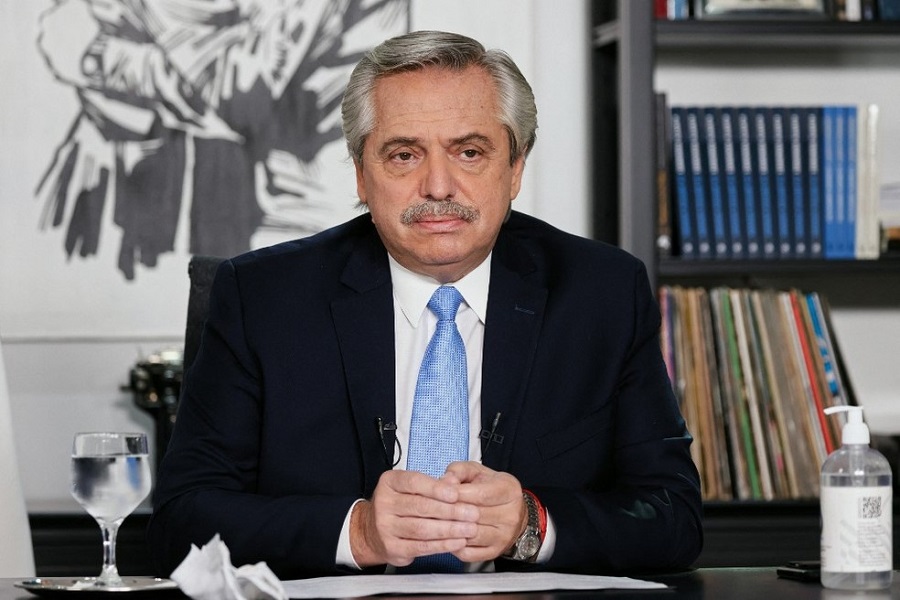RIO DE JANEIRO, BRAZIL – Classes will remain suspended in the area comprising the city of Buenos Aires and the urban areas of the province for another 3 weeks. The country will also be divided into 4 zones according to epidemiological risk.
Argentine President Alberto Fernández announced the new measures to contain the second wave of coronavirus in a television message recorded at the Olivos Residence. According to him, from the new decree of need and urgency which will come into force tomorrow, the country will be divided into 4 zones according to the epidemiological and sanitary risk: low, medium, high and alarm. It will be in force for a further 3 weeks, until May 21st.

“In the areas of medium epidemiological and sanitary risk, it is the local governments’ power and responsibility to implement early additional measures to reduce circulation in order to prevent contagions,” said Fernandez in a message read in front of the camera. “In high-risk epidemiological and sanitary areas, that is, places where there is a high proportion of contagions or where they are rapidly increasing, social activities in private homes, social gatherings in outdoor public spaces for more than 10 people, casinos and discos will be suspended. Bars and restaurants will operate until 11 PM. And no traffic will be allowed between midnight and 6 AM every day”, he reported.
In the epidemiological and sanitary alarm zones, the hardest restrictions will apply because there – he explained – the health system is under stress and the proportion of cases among the population is very high.
“As a result, circulation and other activities will be restricted until May 21st. Commercial premises will operate until 7 PM. After 7 PM, restaurants will be able to operate with home deliveries. During the day, they will only be allowed to serve their customers in outdoor spaces. No traffic will be allowed between 8 PM and 6 AM the following day. Classes will be taught exclusively by distance learning,” he said.
Although it has not yet been officially announced, the Metropolitan Area of Buenos Aires -AMBA, which includes the capital city and the most populated areas of the province of Buenos Aires- is among the areas that would be considered as alarm areas given that the highest number of cases and deaths are reported there, and hospital bed occupancy is on the verge of collapse.
The decision on in-person classes creates a new conflict with the Autonomous City of Buenos Aires, which has already ruled against it and ordered schools to remain open. Disputes regarding in-person classes are in court and a definition by the Supreme Court of Justice is expected in the coming days.
On Friday, Fernández sent a special message to families affected by the decision: “I want to tell you that we know the difficulties this poses to children, adolescents and families. Unfortunately, in these alarm areas this measure to reduce traffic is necessary.”
“We are making every effort to resume careful attendance in these areas when epidemiological and health indicators allow it. It is a challenge for all of us to achieve this,” continued the Argentine head of state. “Today, there are in-person classes in more than 20 Argentine provinces. For us, education is a priority issue. Distance classes are only given where the pandemic so requires it”, he added.
However, the complaints of hundreds of thousands of families are based on the fact that during 2020 children and adolescents did not attend classes for the whole year, unlike the rest of countries in the region and the world.
The presidential message included two political statements. The first one was addressed to Congress. Fernández will submit a bill to empower the Executive and governors, based on scientific criteria, to impose restrictions and precautionary measures during this exceptional situation. The decision is a response to the criticism of opponents and constitutionalists who point out that the President can not order sanitary measures by decree as long as the Congress is in session and in office, as is currently the case.
Until now, the Casa Rosada has always legislated with decrees of need and urgency to establish and withdraw measures related to the pandemic.
The second one was a subtle message to Horacio Rodríguez Larreta, head of the Government of the City of Buenos Aires, with whom there were 10 days of tensions due to the suspension of classes in the capital city. “Since I took office I have worked tirelessly to build dialogues and agreements. Because I am truly convinced that this is what the country needs. And much more so because of the pandemic. We need all to work together in unity,” he said.
And he added: “The measures we are adopting have been taken all over the world. It is impossible to negotiate with the virus. With the virus, we have to take firm measures. I have taken and will take the corresponding decisions without any political speculation. It is impossible to speculate electorally and at the same time care for the people. Any speculation will ultimately help the virus and aggravate the problem. The pandemic measures are strictly to save lives. The norms that we establish must be complied with by all equally.”
Lastly, he urged governors to commit themselves to implement the measures that will be in force until May 21st.
Source: Infobae

